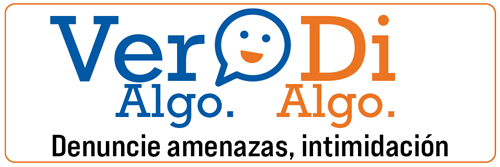Educator Teaches Students to Learn by Doing
 On a recent visit to Marie Lemon’s science lab at Greenville Early College, we found students designing and building habitats for the Greenville Zoo, growing a classroom garden using hydroponics, and learning how to wire an energy-efficient smart house.
On a recent visit to Marie Lemon’s science lab at Greenville Early College, we found students designing and building habitats for the Greenville Zoo, growing a classroom garden using hydroponics, and learning how to wire an energy-efficient smart house.
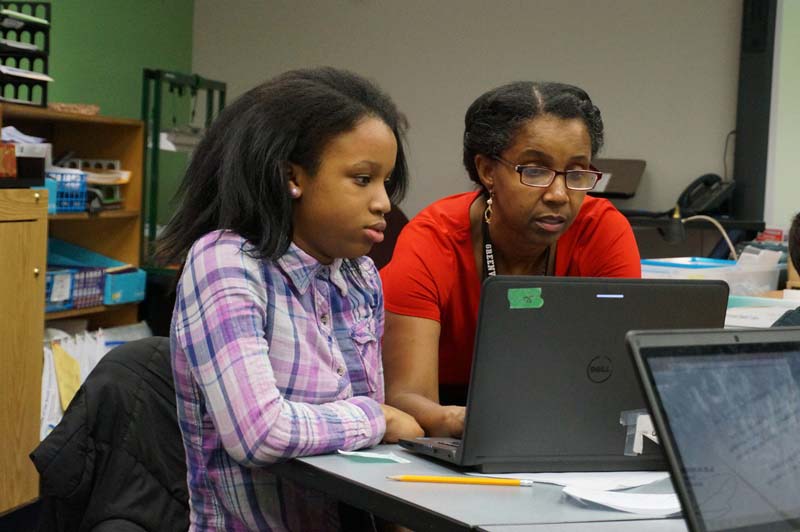 In recognition of her innovative, hands-on teaching, Marie Lemon received the 2016 DuPont Pioneer Excellence in Agricultural Science in Education Award, a partnership with DuPont Pioneer and the National Science Teachers Association (NSTA). The award includes a $5,000 grant for her classroom and all expenses to the NSTA national conference in April. She will also receive classroom resources from DuPont Pioneer and access to a Dupont Pioneer research facility.
In recognition of her innovative, hands-on teaching, Marie Lemon received the 2016 DuPont Pioneer Excellence in Agricultural Science in Education Award, a partnership with DuPont Pioneer and the National Science Teachers Association (NSTA). The award includes a $5,000 grant for her classroom and all expenses to the NSTA national conference in April. She will also receive classroom resources from DuPont Pioneer and access to a Dupont Pioneer research facility.
Lemon’s students use Project Based Learning, where they investigate and respond to complex questions. “The principal told my students we needed to beautify our campus. We were starting a unit on plants, so I asked them, ‘How can we bring some green spaces into this hostile environment?’” said Lemon. The challenge included how to supply water and nutrients to plants without soil in a classroom without natural light.
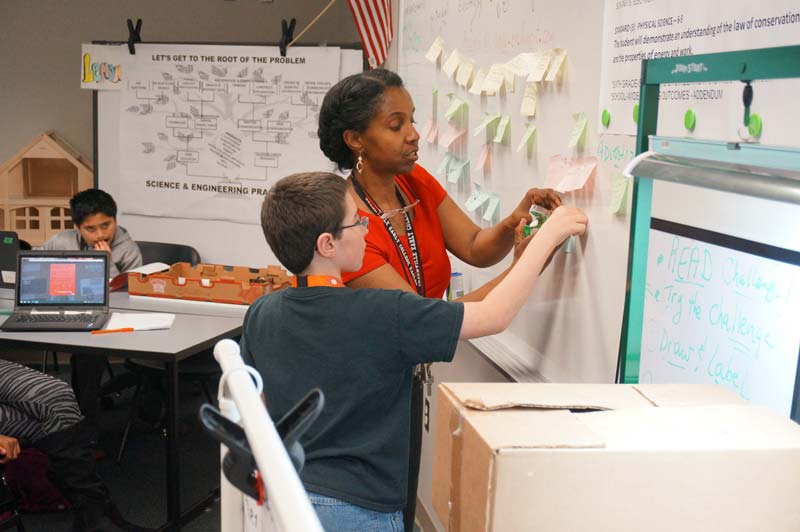 Students came up with the idea of using hydroponics, LED lighting, and fluorescent lights. For this assignment, Lemon solicited the support of Hubbell Lighting to provide the LED lighting. Students decided to grow the plants using hydroponics in a special blend of nutrients and pH solution delivered to the roots through water.
Students came up with the idea of using hydroponics, LED lighting, and fluorescent lights. For this assignment, Lemon solicited the support of Hubbell Lighting to provide the LED lighting. Students decided to grow the plants using hydroponics in a special blend of nutrients and pH solution delivered to the roots through water.
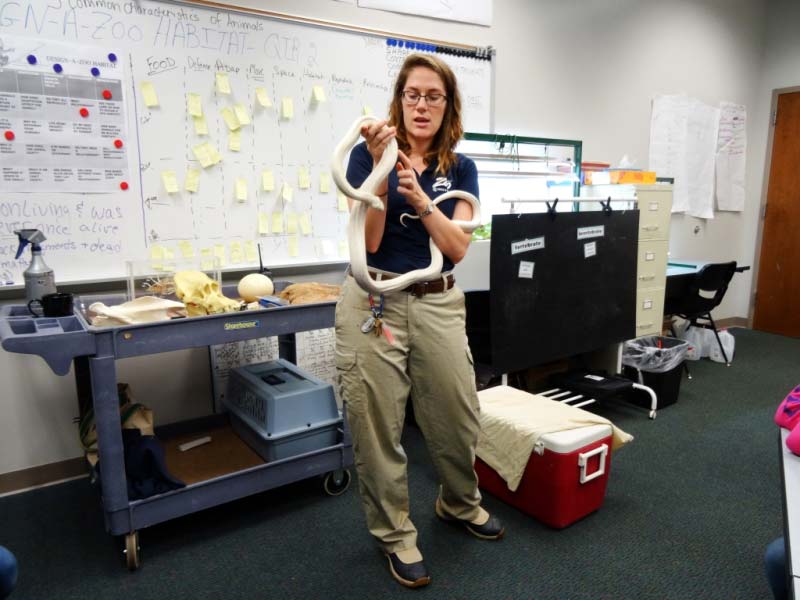 Students found that the fluorescent lights absorbed more water. “There was a vast difference in color between the plants grown with LED and the ones grown with fluorescent lighting, as noted by the astronauts on the Space Station at the time. This allowed them to connect real-world experiments to what they were doing in class,” commented Lemon.
Students found that the fluorescent lights absorbed more water. “There was a vast difference in color between the plants grown with LED and the ones grown with fluorescent lighting, as noted by the astronauts on the Space Station at the time. This allowed them to connect real-world experiments to what they were doing in class,” commented Lemon.
Principal Tiffany Estes said Lemon does whatever it takes to teach students about science. “She doesn’t let a lack of supplies limit her. She sees the need and goes after it. She won the DuPont grant by clearly answering the question of how to grow plants in a hostile environment,” she said.
Earlier this school year, the Greenville Zoo partnered with Lemon’s students to create and design a habitat that would enhance one of the current habitats. Zoo representatives taught virtual lessons, visited the classroom with live animals, and judged the projects during class multimedia presentations. “My students created a blueprint in math class then built their habitat in science class. We ended up with some pretty amazing 3D models,” explained Lemon.
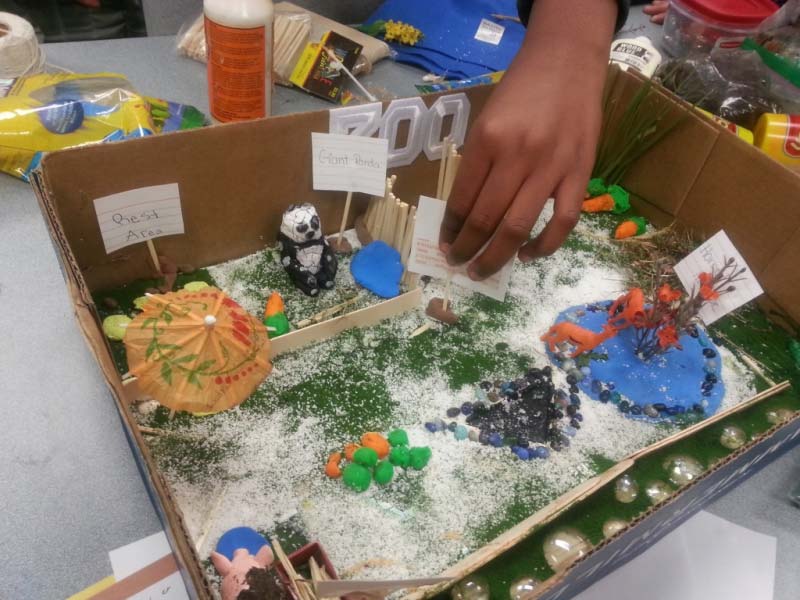 These middle schoolers are currently studying a unit on circuits. They’ll learn to correctly wire a circuit before getting supplies to wire a ‘smarter’ house. “They will have to master skills such as how to put together series and parallel circuits and study different forms of energy that will make their house smarter,” explained Lemon. Lemon said the supplies for this project were funded by grant money from CIAN/RET (Center for Integrated Access Networks/Research Experience for Teachers) and Shell Lab.
These middle schoolers are currently studying a unit on circuits. They’ll learn to correctly wire a circuit before getting supplies to wire a ‘smarter’ house. “They will have to master skills such as how to put together series and parallel circuits and study different forms of energy that will make their house smarter,” explained Lemon. Lemon said the supplies for this project were funded by grant money from CIAN/RET (Center for Integrated Access Networks/Research Experience for Teachers) and Shell Lab.
Last year, Lemon was named a national finalist in the Shell Science Lab Challenge, where she received a prize package valued at $8,500 to enhance the school’s science lab. She continues to build strong partnerships with local and national organizations.


